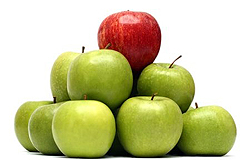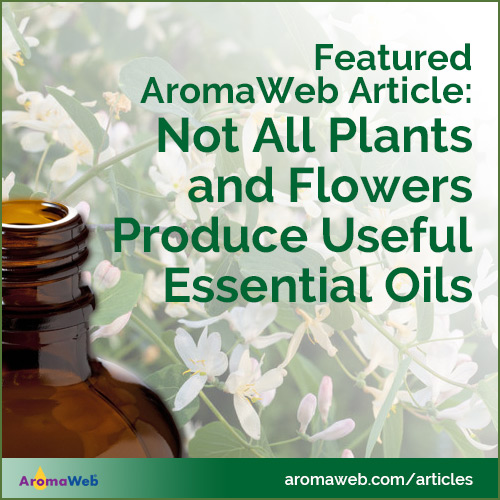Not All Plants Produce Useful Essential Oils

When you view AromaWeb's Essential Oil Profile Directory and when you patronize reputable aromatherapy retailers/suppliers, you'll notice that essential oils are not commercially available for many aromatic botanicals that you may expect to be available. Most fruits, except for citrus fruits, cannot effectively be distilled to produce essential oils. Citrus fruits are the exception to my generic fruit comment because citrus fruits are encased in a "rind" that houses a great deal of essential oil that can be steam distilled or cold pressed to produce essential oils.

Let's take "apple essential oil" as an example...
There is no such thing as a commercially available, steam distilled apple fruit (pulp) essential oil or an apple blossom essential oil. However, in the past, there were various claims that hyped that "green apple essential oil" was helpful for weight loss. Such claims should be discredited because no reputable expert in essential oil usage can claim that green apple essential oil can be beneficial for weight loss since no such oil is commercially available.
It's important to emphasize that essential oils are not the same thing as absolutes, CO2 extracts, herbal extracts, tinctures, attars, vegetable/carrier oils, macerated oils, infused oils, fragrance oils or flavor oils.
Essential oils are sometimes confused with these other types of oils, extracts and other fluids derived from botanicals. This can be problematic because the therapeutic benefits, aroma, best methods of use, safety and cost can vary depending on whether you have a pure essential oil or something else.
Continuing with our apple example, it is possible to find or make natural apple extracts, tinctures, flavor oils, macerated oils, infused oils, all of varying qualities. Additionally, it's possible that Apple Seed Oil may be available as a cold pressed or solvent extracted fatty carrier oil/vegetable oil. However, I cannot comment on the potential quality, benefits or hazards of an apple seed vegetable oil because apple seeds contain a compound that can metabolize into cyanide. The safety of using such an oil as a carrier, if even available, would need to be researched.
Why Are Essential Oils Not Available For So Many Aromatic Flowers, Fruits and Other Plants?
With the exception of citrus oils that can be cold pressed or steam distilled, most essential oils are produced via steam or hydro (water) distillation.
However, the natural aromatic molecules present in many plants are not conducive to steam or water distillation methods or would require such an enormous amount of botanical material that the cost is far too excessive.
Jasmine is a good example. Jasmine flowers are especially aromatic. However, the fragile flowers cannot be effectively steam distilled. Instead, Jasmine does tolerate the solvent extraction process well, so Jasmine is readily available as Jasmine Absolute. Jasmine CO2 Extract is now also becoming more commercially available, and it is exquisite.
In some cases, an aromatic botanical isn't conducive to any form of extraction or distillation and thus isn't typically commercially available as an essential oil, CO2 extract or as an absolute.
Is It an Authentic Essential Oil or Isn't It?
You may come across reputable vendors that do offer limited quantities of essential oils or absolutes that are rarely available. In these instances, it is usually because the amount of plant material required and/or the manpower required to produce the oil is especially costly or that there is limited demand. However, there are countless companies around the Web that are intentionally (or just out of stupidity) selling fragrance oils, adulterated essential oils, extracts or other liquid aromatics that are falsely labeled as pure essential oils or absolutes. It's important to be able to distinguish between reputable sellers of truly rare and precious essential oils and misleading businesses.
Lilac CO2 Extract is commercially available in limited quantities, but lilac absolute and a true lilac essential oil are not readily available. There is a company, for example, that produces an aromatic lilac oil by using alcohol to extract the aromatic molecules from a pomade that they laboriously produce by hand using the lilac blossoms harvested from their lilac farm. They promote the product as an "essential oil." The company explains that lilacs cannot be steam distilled or solvent extracted because of the unique way that lilacs produce their aroma. I personally hold concern with the product being referred to as an "essential oil," as it is not distilled. This company, however, is also not trying to deceive its customers about the product's method of production, and there really is no term in use (that I know of) that applies to the lilac oil they laborously and lovingly produce.
The takaway from this is to always confirm the method of extraction to ensure that you are clear on the details of the oil you are considering purchasing. Reputable suppliers of rare essential oils will have a solid reputation within the holistic aromatherapy industry and/or will generally be eager and proud to describe an oil, its method of production and other details. Ideally, they will also provide independent testing that can shed light to the legitimacy of the oil. (For more information, see AromaWeb's How to Buy Essential Oils article.)
